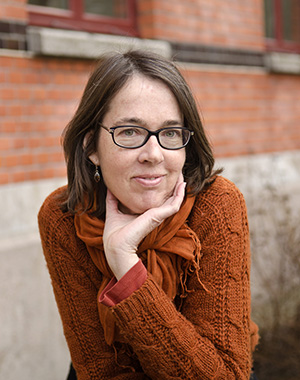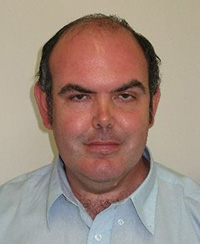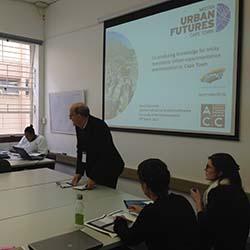New book Co-producing knowledge for sustainable cities
While cities are managed within traditional organizational structures and departments, many urban challenges such as climate change, resource constraints, poverty, poor health, and social tensions exceed the boundaries of the current compartmentalization of policy-making, planning, administration and academic knowledge production. Urban challenges, by their nature, engage a variety of stakeholders, decision-making levels, local–global contexts, disciplines and sectors.
The new book Co-producing knowledge for sustainable cities – Joining Forces for Change is about producing knowledge in urban areas. More specifically, it focuses on how decision-makers, civil servants, private actors and civil society come together with researchers to co-produce knowledge that can be used to contribute to creating more sustainable urban futures.
The book covers experiences of co-producing knowledge from Mistra Urban Futures platforms in Gothenburg, Cape Town, Kisumu and Greater Manchester as well as from Melbourne and Southeast Asia, a chapter written by Board member Colin Fudge together with John Fien. The Editor of the book is Associate Professor, Merritt Polk, University of Gothenburg and Mistra Urban Futures.
Merritt, what are some of the advantages of co-producing knowledge?

"The main advantages of co-production are new and strengthened relationships between different individuals and organizations that are researching or working with sustainable urban development. This includes stronger relationships not only among researchers working within different disciplines, but also among civil servants from the public bodies, across decision making levels and sectors. Most importantly, all of the examples of co-production from the different cities resulted in the development of new and stronger relationships between research and practice. This includes, for example, an increased sharing of responsibility for formulating more practically valuable research questions that build upon both scientific proficiency and practical expertise and know-how. It also resulted in new ways of working together from co-leadership in Göteborg, to embedded researchers in Cape Town. Bringing together new constellations of individuals, and promoting cross disciplinary as well as cross organizational projects, resulted in new insights and substantive knowledge about the different issues and strengthened local capacities for research."
What are some critical issues and challenges, Merritt?
"There are many critical issues and challenges when working with different types of co-production. Time, or lack of time, is one of the most critical. All of the project and activities from the different cities in the book had problems with fitting the needs of the projects into the temporal frameworks of traditional research and practice. Mistra Urban Futures attempts to create a new space for working together. However, this space exists within well-established practice in public bodies, university institutions and funding organizations. Overall, the diversity of individuals and organizations involved in co-production mean that projects and activities require more time to initiate, staff, design, carryout and implement. There were also a number of institutional mismatches and communication barriers, both research and practice-based, in all of the cities. More specifically, research is organized more individually by researchers and evaluated according to disciplinary scientific standards. The public bodies are politically run and regulated, with clear decision-making structures, mandates and follow-up. Co-production, because it is designed to cross over different organizational and disciplinary barriers, does not fit within either of these structures. Creating results that are viable for both research and practice is also highly problematic. It not only takes more time, it also requires developing approaches that ensure in-depth participation in the projects, as well as communication strategies that are tailored for different target audiences within both research institutions and public bodies."
The chapter from Cape Town focuses on co-producing knowledge for whom, and to what end? Warren Smit, researcher at the African Centre for Cities and involved in the work of the platform in Cape Town.
Warren, what is some of your main reflections in the book?
 “The African Centre for Cities has been involved in co-production work in Cape Town since 2008. Our chapter reflects on some of the key lessons in successfully working together with a range of partners to co-produce knowledge that can help respond to urban problems. In particular, it is important that participants in knowledge co-production processes are explicit about the changes they want to see in the world, and about the assumptions underpinning these desired changes. Participants in knowledge co-production processes also need to be transparent about who is and who is not involved, how the “problems” being addressed are defined, and the choice of research approaches and methods.”
“The African Centre for Cities has been involved in co-production work in Cape Town since 2008. Our chapter reflects on some of the key lessons in successfully working together with a range of partners to co-produce knowledge that can help respond to urban problems. In particular, it is important that participants in knowledge co-production processes are explicit about the changes they want to see in the world, and about the assumptions underpinning these desired changes. Participants in knowledge co-production processes also need to be transparent about who is and who is not involved, how the “problems” being addressed are defined, and the choice of research approaches and methods.”
The book Co-producing knowledge for sustainable cities – Joining Forces for Change is published by Routledge, read more here







